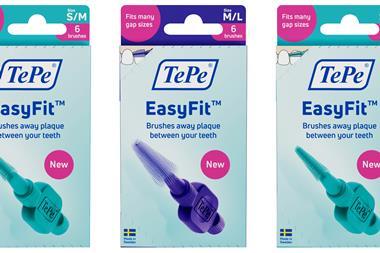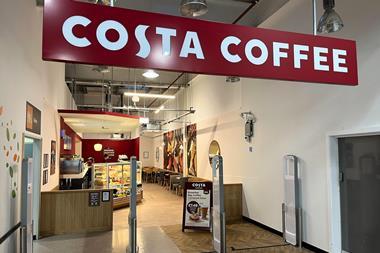With retail crime on the rise, supermarkets aren’t taking any chances and are turning to third parties to monitor crime and recoup losses. But are they justified? Alex Black reports
Nina is hardly a career criminal. She's 50, disabled and gets by on benefits. However, last March, she was made to feel like one, after walking out of a Tesco store with goods she'd forgotten to pay for. She was apprehended by staff, who invited her to come back inside and pay for the items but before she could do so, a private security guard pulled her to one side and she was frogmarched to the local police station.
Although Nina was released without charge by the police, she received a letter from a civil recovery firm less than a week later, demanding the princely sum of £137.50. The amount was itemised: value of goods stolen was 'nil', £82.50 was attributed to 'staff time', £24.75 for 'admin costs' and £30.25 for 'security and surveillance'.
The claim against Nina was dropped she was asked about her circumstances and on discovering her mental health problems, Tesco wisely backed off. But the bigger issue rages on: are Britain's supermarket behemoths profiting from acts of petty theft by exploiting civil recovery laws? The Citizens Advice Bureau (CAB) thinks so. At the end of last year it released a report entitled 'Unreasonable demands?', urging retailers to use "means that are fair and proper" to seek civil redress, rather than resort to third parties to "demand substantial sums as compensation".
The report received short shrift from Tesco, which makes no apologies for using civil recovery. Many incidents of shoplifting are by organised criminals, who steal goods to order, rather than forgetful "little old ladies", it claims. Its message to potential shoplifters is simple: "Don't shoplift and you won't have to worry about civil recovery," says a spokesman.
Asda is similarly unrepentant. "We view civil recovery as an important part of our programme of reducing shop theft and crime ... and make no apology for using it," it states. According to retailers, the issue isn't about the cost of goods stolen, but the cost of security.
And with good reason, if the latest figures are anything to go by. Nottingham-based civil recovery company Retail Loss Prevention (RLP) claims that shoplifting incidents at its supermarket clients (which include Lidl, The Co-operative Group, Iceland, Tesco, Waitrose, Netto and Morrisons) were up 33.7% in 2009 with incidents involving employees increasing 22.7%.
The average amount stolen in a shoplifting incident also increased, from £49.23 to £69.74. More worrying still for retailers is the growing use of violence. RLP's records show shoplifting incidents involving abuse or violence rose 17.4% in 2009.
While the amounts levied against shoplifters accidental or otherwise may seem excessive to the layperson, they pale into insignificance compared with retailers' bills for policing stores, according to RLP's managing director Jackie Lambert.
"In each case, there may be elements of surveillance, paperwork, recovering stolen goods, re-labelling and putting goods back on the shelf if possible and updating company records," she says. "These costs reflect retailers' investment in security."
RLP is one of a growing number of companies involved in what CAB social policy officer Richard Dunstan describes as "a very lucrative business". The amount RLP demands from the individuals pursued varies from less than £100 to several thousand pounds. Although it refuses to confirm how many cases it handles on behalf of retail clients, in 2006 the number reported on its website was 60,000, and this is likely to have increased significantly since then.
Civil recovery is essentially a volume game and Bradford-based law firm Drydens, which represents Asda and has also issued civil recovery claims on behalf of Marks & Spencer and Sainsbury's, takes a slightly different tack to RLP, demanding a flat fee of £150 from individuals. "This sum is passed back to the retailer minus our fee for providing the service," says chairman, Philip Holden.
How much is passed back is unclear. Unsurprisingly, none of the retailers approached for this feature were prepared to comment on their security costs or how much money they make from civil recovery. But the CAB estimates that, after fees, the total amount collected by Drydens and RLP for their clients is roughly £3m per year the tip of the iceberg as far as the value of the civil recovery 'market' to retailers is concerned, but a drop in the ocean compared with their total security costs.
Regardless of how much money the retailers make if any the primary objective, they stress, is to deter thieves. Retailers see civil recovery as an integral part of their overall anti-crime strategy and a highly effective deterrent, particularly when it comes to serial offenders. Lambert claims that "less than 3% of people we deal with are repeat offenders".
And it's not just shoplifters they are hoping to deter. The Co-op Group uses the threat of recovery to recoup losses from drivers who leave its forecourts without paying for fuel. Customers are given seven days to pay, after which point the matter may be reported to police and civil recovery procedures can commence, according to a spokesman. Charges are levied on a fixed scale, depending on the cost of the fuel, and customers have a right of appeal if they feel they have been treated unfairly.
In this case, the threat appears to work. "The overwhelming majority of customers pay for their fuel within the seven days," says the spokesman. Indeed, so successful has the scheme been that it is now being rolled out to Somerfield stores.
Retailers such as The Co-op Group are increasing their use of civil recovery as a deterrent, but not everyone believes they should. In the conclusion to the 'Unreasonable demands?' report, the CAB's Dunstan wrote: "Neither Parliament nor society at large has debated, let alone sanctioned, the widespread use of threatened civil recovery as a deterrent against retail crime".
Dunstan wants to see civil recovery limited to cases involving "serious, determined or persistent offences for which there has been a criminal conviction". For the time being at least, retailers appear to be content to err on the side of caution when it comes to pursuing shoplifters.
Lambert says that each case is judged on its merits and that her company only pursues civil recovery if the incident breaches the Theft or Fraud Act. "If the person doesn't pay, we ask the client how they wish to proceed and offer advice based on the strength of the case," she says.
Even cases that merit civil recovery proceedings are pursued with caution, claims Holden. "We have strict working practices and always offer individuals several opportunities to discuss the matter and provide as much information on their personal circumstances as they like," he says. For obvious reasons, he won't discuss the exact circumstances in which his firm advises the retailer to drop a claim Asda says its policy is not to issue claims letters to offenders under 16, over 65 or the mentally disturbed but he is keen to stress that civil recovery should be done in a "responsible and ethical" way.
In other words, while retailers will only proceed with a claim once they have enough proof to stand the accusation up in a civil court, they also try to steer well clear if the subject in question is considered vulnerable, as was the case with Nina. Retailers argue her case proves the system works.
However, Dunstan says she shouldn't have been subjected to the ordeal in the first place. He fears that unless action is taken to scale back the use of civil recovery, more people will suffer. If its use rises, civil recovery could become more of a misnomer than it arguably already is.
Nina is hardly a career criminal. She's 50, disabled and gets by on benefits. However, last March, she was made to feel like one, after walking out of a Tesco store with goods she'd forgotten to pay for. She was apprehended by staff, who invited her to come back inside and pay for the items but before she could do so, a private security guard pulled her to one side and she was frogmarched to the local police station.
Although Nina was released without charge by the police, she received a letter from a civil recovery firm less than a week later, demanding the princely sum of £137.50. The amount was itemised: value of goods stolen was 'nil', £82.50 was attributed to 'staff time', £24.75 for 'admin costs' and £30.25 for 'security and surveillance'.
The claim against Nina was dropped she was asked about her circumstances and on discovering her mental health problems, Tesco wisely backed off. But the bigger issue rages on: are Britain's supermarket behemoths profiting from acts of petty theft by exploiting civil recovery laws? The Citizens Advice Bureau (CAB) thinks so. At the end of last year it released a report entitled 'Unreasonable demands?', urging retailers to use "means that are fair and proper" to seek civil redress, rather than resort to third parties to "demand substantial sums as compensation".
The report received short shrift from Tesco, which makes no apologies for using civil recovery. Many incidents of shoplifting are by organised criminals, who steal goods to order, rather than forgetful "little old ladies", it claims. Its message to potential shoplifters is simple: "Don't shoplift and you won't have to worry about civil recovery," says a spokesman.
Asda is similarly unrepentant. "We view civil recovery as an important part of our programme of reducing shop theft and crime ... and make no apology for using it," it states. According to retailers, the issue isn't about the cost of goods stolen, but the cost of security.
And with good reason, if the latest figures are anything to go by. Nottingham-based civil recovery company Retail Loss Prevention (RLP) claims that shoplifting incidents at its supermarket clients (which include Lidl, The Co-operative Group, Iceland, Tesco, Waitrose, Netto and Morrisons) were up 33.7% in 2009 with incidents involving employees increasing 22.7%.
The average amount stolen in a shoplifting incident also increased, from £49.23 to £69.74. More worrying still for retailers is the growing use of violence. RLP's records show shoplifting incidents involving abuse or violence rose 17.4% in 2009.
While the amounts levied against shoplifters accidental or otherwise may seem excessive to the layperson, they pale into insignificance compared with retailers' bills for policing stores, according to RLP's managing director Jackie Lambert.
"In each case, there may be elements of surveillance, paperwork, recovering stolen goods, re-labelling and putting goods back on the shelf if possible and updating company records," she says. "These costs reflect retailers' investment in security."
RLP is one of a growing number of companies involved in what CAB social policy officer Richard Dunstan describes as "a very lucrative business". The amount RLP demands from the individuals pursued varies from less than £100 to several thousand pounds. Although it refuses to confirm how many cases it handles on behalf of retail clients, in 2006 the number reported on its website was 60,000, and this is likely to have increased significantly since then.
Civil recovery is essentially a volume game and Bradford-based law firm Drydens, which represents Asda and has also issued civil recovery claims on behalf of Marks & Spencer and Sainsbury's, takes a slightly different tack to RLP, demanding a flat fee of £150 from individuals. "This sum is passed back to the retailer minus our fee for providing the service," says chairman, Philip Holden.
How much is passed back is unclear. Unsurprisingly, none of the retailers approached for this feature were prepared to comment on their security costs or how much money they make from civil recovery. But the CAB estimates that, after fees, the total amount collected by Drydens and RLP for their clients is roughly £3m per year the tip of the iceberg as far as the value of the civil recovery 'market' to retailers is concerned, but a drop in the ocean compared with their total security costs.
Regardless of how much money the retailers make if any the primary objective, they stress, is to deter thieves. Retailers see civil recovery as an integral part of their overall anti-crime strategy and a highly effective deterrent, particularly when it comes to serial offenders. Lambert claims that "less than 3% of people we deal with are repeat offenders".
And it's not just shoplifters they are hoping to deter. The Co-op Group uses the threat of recovery to recoup losses from drivers who leave its forecourts without paying for fuel. Customers are given seven days to pay, after which point the matter may be reported to police and civil recovery procedures can commence, according to a spokesman. Charges are levied on a fixed scale, depending on the cost of the fuel, and customers have a right of appeal if they feel they have been treated unfairly.
In this case, the threat appears to work. "The overwhelming majority of customers pay for their fuel within the seven days," says the spokesman. Indeed, so successful has the scheme been that it is now being rolled out to Somerfield stores.
Retailers such as The Co-op Group are increasing their use of civil recovery as a deterrent, but not everyone believes they should. In the conclusion to the 'Unreasonable demands?' report, the CAB's Dunstan wrote: "Neither Parliament nor society at large has debated, let alone sanctioned, the widespread use of threatened civil recovery as a deterrent against retail crime".
Dunstan wants to see civil recovery limited to cases involving "serious, determined or persistent offences for which there has been a criminal conviction". For the time being at least, retailers appear to be content to err on the side of caution when it comes to pursuing shoplifters.
Lambert says that each case is judged on its merits and that her company only pursues civil recovery if the incident breaches the Theft or Fraud Act. "If the person doesn't pay, we ask the client how they wish to proceed and offer advice based on the strength of the case," she says.
Even cases that merit civil recovery proceedings are pursued with caution, claims Holden. "We have strict working practices and always offer individuals several opportunities to discuss the matter and provide as much information on their personal circumstances as they like," he says. For obvious reasons, he won't discuss the exact circumstances in which his firm advises the retailer to drop a claim Asda says its policy is not to issue claims letters to offenders under 16, over 65 or the mentally disturbed but he is keen to stress that civil recovery should be done in a "responsible and ethical" way.
In other words, while retailers will only proceed with a claim once they have enough proof to stand the accusation up in a civil court, they also try to steer well clear if the subject in question is considered vulnerable, as was the case with Nina. Retailers argue her case proves the system works.
However, Dunstan says she shouldn't have been subjected to the ordeal in the first place. He fears that unless action is taken to scale back the use of civil recovery, more people will suffer. If its use rises, civil recovery could become more of a misnomer than it arguably already is.
Retail crime: in numbers
The BRC's latest Retail Crime Survey was released in January. Some 63% of the stores involved in the survey were supermarkets or c-stores. The survey revealed that: lStealing by customers accounted for the biggest share of all retail crime last year, both by the number of incidents (94%) and by monetary value (42%).
Some 68.4% of customer thefts were from supermarkets.
Thefts by employees only accounted for around 7% of all thefts, but the average value of goods stolen per incident rose 271% from £235 to £872. On average, employee theft cost nearly 20 times customer theft per incident.
Violent incidents against staff have doubled in frequency. At least 22,000 retail staff suffered physical or verbal attacks or threats, with the overall level of recorded incidents now running at 20 per 1,000 staff.
The survey recorded 498,405 incidents over the course of the year, but as retailers estimate only half of all thefts are detected, the real figure was probably between 750,000 and one million.
Retail crime cost UK shops £1.1bn in 2009, 10% more than the previous year and equivalent to 72,000 jobs.
Source: BRC Retail Crime Survey 2009
The BRC's latest Retail Crime Survey was released in January. Some 63% of the stores involved in the survey were supermarkets or c-stores. The survey revealed that: lStealing by customers accounted for the biggest share of all retail crime last year, both by the number of incidents (94%) and by monetary value (42%).
Some 68.4% of customer thefts were from supermarkets.
Thefts by employees only accounted for around 7% of all thefts, but the average value of goods stolen per incident rose 271% from £235 to £872. On average, employee theft cost nearly 20 times customer theft per incident.
Violent incidents against staff have doubled in frequency. At least 22,000 retail staff suffered physical or verbal attacks or threats, with the overall level of recorded incidents now running at 20 per 1,000 staff.
The survey recorded 498,405 incidents over the course of the year, but as retailers estimate only half of all thefts are detected, the real figure was probably between 750,000 and one million.
Retail crime cost UK shops £1.1bn in 2009, 10% more than the previous year and equivalent to 72,000 jobs.
Source: BRC Retail Crime Survey 2009














No comments yet